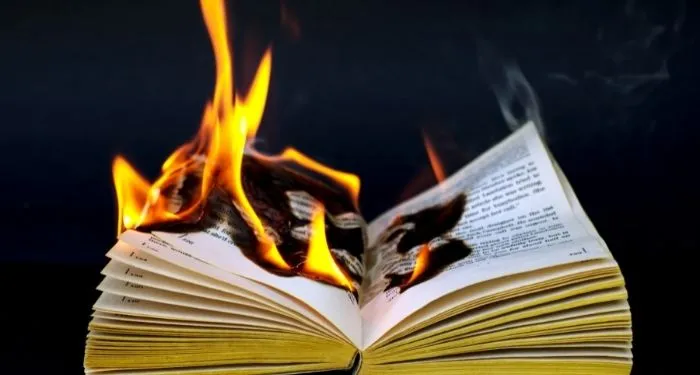
Rapid City Area Schools Withheld 350+ New Books and Attempted to Quietly Destroy Them
The Rapid City Area school board (South Dakota) voted last night to delay a vote that would destroy hundreds of brand new books purchased for use by students. The books include:
- 185 copies of How Beautiful We Were by Imbolo Mbue
- 35 copies of Fun Home by Alison Bechdel
- 75 copies of The Perks of Being a Wallflower by Stephen Chbosky
- 30 copies of Girl, Woman, Other: A Novel by Bernardine Evaristo
- 30 copies of The Circle Dave Eggers.
No media in the area reported on this story until yesterday, hours before the vote was to take place, in part because the information about the book destruction was buried under a “surplus material” form–no prior complaints in a public forum were made. Like many public institutions, the dissolution of materials paid for by tax money goes through a process of either being sold or destroyed. Unfortunately, the story here is not that the books are being destroyed but rather, why over 350 books to be used in classrooms–several of which are new award winning titles and all of which are by or about people of color and/or queer people–are no longer being used.
According to a statement from the school’s Public Information Manager Caitlin Pierson, “The books are being pulled from the reading list for English 12 classes. The building administrators and the Director of Teaching, Learning, and Innovation agreed on this decision, based on the content of the books. Each year, some used books are either destroyed or sold on palettes.”
Unfortunately, that’s not the story. The books were purchased for English 12 classes last fall, but they never made it to classrooms.
The Rapid City Journal reported that RCAS Director of Teaching, Learning and Innovation Valerie Brablec Seales said the books were deemed inappropriate by administrators. Seales says she knew something was not quite right when three high school principals in the district sent her copies the book’s pages and said they did not want that in classrooms. Another building administrator reached out shortly thereafter which instructed the school principals to pull and review the books.
It is not clear whether those administrators read the books or pulled excerpts from any of the dozens of right-wing sites sharing them to create scenarios just like this.
At last night’s meeting, community members and the board discussed the book, using the same rhetoric used across the country during this current wave of book bans. These titles were deemed inappropriate for 12th graders–17 and 18 year olds–as they contained violence and pornographic scenes. Board President Kate Thomas said that the removal of the books was not about personal feelings but instead, about “the appropriateness of content.” She emphasized that being cautious with book being used in classrooms, even with legal or near-legal adults, is important to keep public trust in the school district.
The discussion at the meeting led to a pause on a decision about the book’s fate under the surplus list, but the real story is why 350 books, selected by educators in the district for senior-level English courses, were silently pulled before ever making it to the classroom. This is a shining example of quiet/soft censorship, and Rapid City Area schools are not the first–nor will they be the last–to use this tactic to keep books by and about marginalized people out of schools. Rather than encourage discussion, discourse, or even pushback from the community, administration removed the books. By sneaking them under the surplus property form as part of the Board’s consent agenda, they hoped the story never to go public at all.
These are brand new books meant to be used in this school year, but students never got the chance to use them. The administration took away not only students’ rights to intellectual freedom but undermined the professionals who selected these texts for use in their classrooms.
Because the vote was not held last night, there is time to act. Whether or not you’re local to Rapid City schools, write some letters to the Board (email addresses are here) and write some letters to the regional papers asking why the books never made it to shelves. This is also a call to action for citizens who care about censorship to pay attention to the sneaky ways these attempts to quietly pull books happens. What might be going unnoticed in surplus supplies reports?
There is a lot more to this story, but it will take pushing the Board and administration to get those answers.
For more ways to take action against censorship, use this toolkit for how to fight book bans and challenges, as well as this guide to identifying fake news. Then learn how and why you may want to use FOIA to uncover book challenges.













